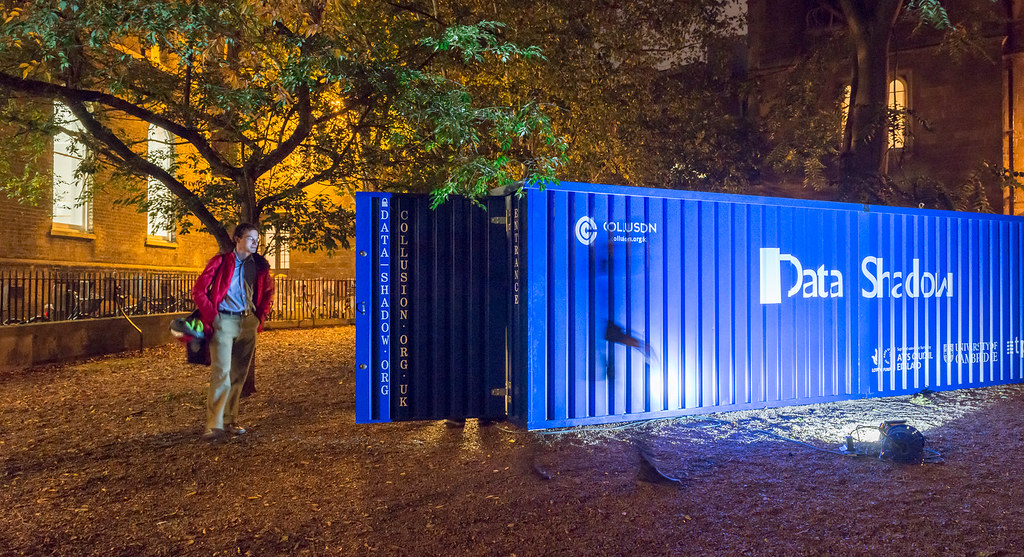Real Time Commission 2015
Artist Mark Farid’s Data Shadow aimed to encourage the public to question the privacy we sacrifice by sharing our personal data. Just what are we agreeing to share? Participants entered, one at a time, the 8 x 2m shipping container that contained the piece. During their journey through the container, each participant came face-to-face with their own personal data shadow. The installation was presented in central Cambridge from 26 October – 1 November 2015.

Data Shadow challenged the public to question the privacy they sacrifice by using an internet-connected mobile phone and apps, cloud storage services and social media. Just what are you agreeing to share? View our film and the Anglia TV coverage.
Despite average citizens’ increasing understanding of the currency of personal information shared with companies such as Apple and Google via apps and on social media, our use of them increases daily. As our data shadow continues to grow and evolve, what happens when people are individually confronted by their seemingly random personal and private information?
Whether we are aware of it or not, we treat our phones as we would treat a human. We set the background to personal images, we customise their cases to our liking, we have conversations with them through programmes like Siri, and find answers to every passing quandary. We use them for work and for socialising. Unlike a personal computer, it never leaves our side. Phones are a link to family, friends and foes, and they’ve become an extension of ourselves.
Our mobile phones go with us everywhere, and when they aren’t within arm’s reach, we’re lost until we find them. We can search for people on the internet and learn a lot about them very easily. Through Google, LinkedIn, Twitter and Facebook we can quickly ascertain many elements of a person’s character – and our phones can likewise tell us a lot about ourselves.
We are aware, to varying degrees, that our information is not private. The amount of information and how intrusive this information is raises questions over the level of security over our data and becomes a pressing matter as we enter an age where the digital is starting to supersede the physical, and further cries from the government to increase surveillance continue. Data flows all around us from our phones all the time, each phone sending out on average 350,000 messages a day.
Do you still have nothing to hide when you’re faced with your own personal information?
Mark Farid was awarded Collusion’s Real Time Commission in June 2015 following an international open call for submissions.
Commissioned by Collusion in partnership with The Technology Partnership, the University of Cambridge and Arts Council England.
Artists
Mark Farid
Mark is a conceptual artist who examines the formation of the projected self, and how our constructed identity is shaped by societal expectations. He graduated from Kingston University, London, with a first class degree in fine art, 2014, and has since participated in group and solo exhibitions in London, Paris, Frankfurt and Abu Dhabi. At 23 years old, Mark hit the headlines (Nov 2014) when he announced that he planned to spend 28 days in virtual reality, immersing himself in someone else’s life – even eating the food they ate.

